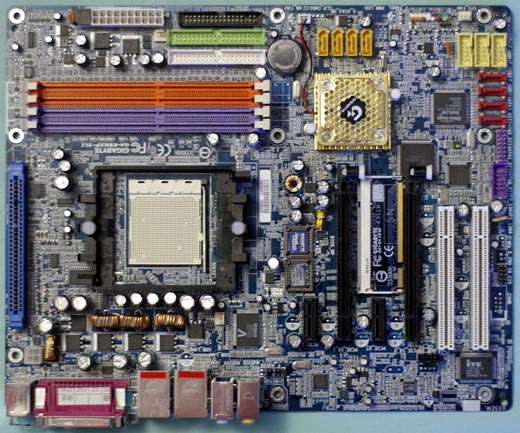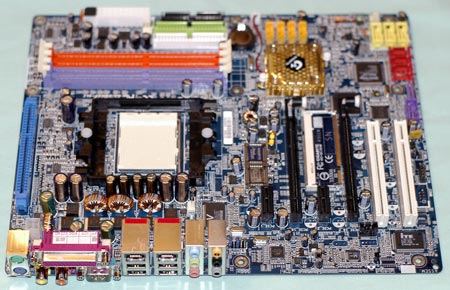nForce4 SLI Roundup: Painful and Rewarding
by Wesley Fink on February 28, 2005 7:00 AM EST- Posted in
- Motherboards
Gigabyte K8NXP-SLI: Features and Layout
| Specification | Gigabyte K8NXP-SLI |
| CPU Interface | Socket 939 Athlon 64 |
| Chipset | nForce4 SLI (single chip) |
| BUS Speeds | 200MHz to 400MHz (in 1MHz increments) |
| PCI/AGP Speeds | Asynchronous (Fixed) |
| PCI Speeds | 100MHz to 150MHz in 1MHz increments |
| Core Voltage | Auto, 0.80V to 1.75V in 0.025V increments |
| DRAM Voltage | Normal, +0.1V, +0.2V |
| Chipset Voltage | Normal, +0.1V, +0.2V, +0.3V |
| Hyper Transport Ratios | Auto, 1x to 5x in 1x increments |
| LDT Bus Transfer | 16/16, 16/8, 8/16, 8/8 |
| LDT Voltage | Normal, +0.1V, +0.2V, +0.3V |
| CPU Ratios | Auto, 4x to 25x in 0.5x increments |
| Cool'n'Quiet MAX FID | Auto, 8.0 to 13.0 in 0.5x increments |
| DRAM Speeds | Auto, 100, 133, 166, 200 |
| Memory Command Rate | Auto, 1T, 2T |
| Memory Slots | Four 184-pin DDR Dual-Channel Slots Unbuffered Memory to 4GB Total |
| Expansion Slots | 2 x16 PCIe Slots 2 x1 PCIe 2 PCI Slots |
| SLI Setup | Movable PCB Card |
| Onboard SATA | 4-Drive SATA 2 by nF4 PLUS 4-Drive SATA by Sil3114 |
| Onboard IDE | Two Standard nVidia ATA133/100/66 (4 drives) |
| SATA/IDE RAID | 4-Drive SATA 2 PLUS 4-Drive IDE (8 total) Can be combined in RAID 0, 1 PLUS 4-Drive SATA by Sil3114 Sil3114 Raid 0, 1, 5 |
| Onboard USB 2.0/IEEE-1394 | 10 USB 2.0 ports supported nF4 3 1394B FireWire 800 ports by TI chip |
| Onboard LAN | Dual Gigabit Ethernet PCIe by Vitesse VSC8201 PHY PCIe by Marvel 88E8053 |
| Onboard Audio | Realtek ALC850 8-Channel codec with 6 UAJ audio jacks, CD-in, front audio, and coaxial SPDIF In and Out |
| Other Features | Gigabyte Dual BIOS |
| BIOS | Award 2/01/2005 |
The shipping Gigabyte BIOS for the K8NXP-9/K8NXP-SLI family provides a wide and useful range of adjustments for many features, with the notable exception of a very limited range of memory voltage adjustments compared to other boards in the SLI roundup. As is the Gigabyte custom in recent designs, Advanced Chipset Features (and Memory Timings) can only be seen when you hot press CTRL+F1 while in the BIOS. HyperTransport adjustments are also provided in the hidden Advanced Chipset Features menu.
There are no BIOS options for adjusting or controlling SLI. This is handled in the nForce4 platform drivers and the nVidia graphics drivers.
The Gigabyte K8NXP-SLI, like the sister K8NXP-9, was designed as a top-of-the-line nForce4 motherboard. As the flagship model, it sports all the top Gigabyte features.


We are pleased that Gigabyte uses the nF4 on-chip Gigabit LAN by supporting it with a Vitesse (Cicada) Gigabit PHY. Gigabyte then goes one step further by including a second Gigabit LAN on the PCI Express Bus. This second LAN is also removed from the constraints of the slower PCI bus as it resides on the much faster PCIe bus.
Audio is AC '97 2.3, supported by the popular 8-channel Realtek ALC850. The K8NXP-SLI9 includes a wide range of audio I/O provided to make the most of the 850 chip. This includes 6 programmable audio mini-jacks and coax SPDIF in and out - all on the rear panel.
A pioneering feature for Gigabyte has been their support of high-speed 1394B Firewire on their boards. This continues with the K8NXP-SLI with 2 ports capable of 800MB/s or Firewire 800. This is double the speed of 1394A for those looking for fast Firewire access.
From a feature, board layout, and BIOS options point of view, the K8NXP-SLI can be considered the twin of the K8NXP-9. The only real change is the replacement of one PCI slot with a second PCIe video slot. All the good things about the features and layout of the K8NXP-9 are still here in the K8NXP-SLI.
DFI LANParty nF4 SLI-DR: Overclocking and Stress Testing
Gigabyte K8NXP-SLI: Overclocking and Stress Testing










108 Comments
View All Comments
TigerFlash - Monday, July 4, 2005 - link
I thought this link would be rather important to see:http://forum.msi.com.tw/index.php?topic=82427.0
TigerFlash - Monday, July 4, 2005 - link
NightCrawler - Thursday, May 5, 2005 - link
You make a big deal out of the fact that the DFI can hit 318 but they both do the same 2.8 ghz, users won't see much difference, if any.Asus: Maximum OC:
(Standard Ratio) 234x12 (Auto HT, 2-3-3-7, 1T, 2.8V)
2808MHz (+17%)
Maximum FSB:
(Lower Ratio) 255x11 (2805MHz) (4X HT, 2.5-3-3-7, 2.7V)
(1:1 Memory, 1T, 2 DIMMs in DC mode)
(+28% Bus Overclock)
DFI: Maximum OC:
(Standard Ratio) 238x12 (Auto HT, 2-3-2-7, 1T, 2.9V)
2856MHz (+19%)
Maximum FSB:
(Lower Ratio) 318x9 (2862MHz) (Auto HT, 2.5-4-3-7, 2.9V)
(1:1 Memory, 1T, 2 DIMMs in DC mode)
(+59% Bus Overclock)
DeanO - Monday, April 18, 2005 - link
Don't know if anyone's noticed yet, but I just took a trip over to MSI's website, and guess what? Only the SLI mobo has the Creative chip. The Neo4 (i.e. nF4 Ultra chipset) mobo uses the Realtek ALC850. I for one was disappointed...That makes for an interesting decision: the SLI board is still cheaper than the Ultra board plus a Creative 24-bit sound card. Hmmm...
phusg - Friday, March 4, 2005 - link
New PCI card with C-Media DDL chip: http://www.avsforum.com/avs-vb/showthread.php?s=&a... ge=20&pagenumber=1Currently only available via ebay apparantly:
http://search.ebay.com/HDA-Digital-X-Mystique-7-1-...
If it has the same performance as Soundstorm remains to be seen. Reading the thread the EAX support is just as dodgy as it was on Soundstorm.
ElFenix - Thursday, March 3, 2005 - link
What chipsets did your USB and firewire drives have?thanks for the great review!
bjorn44 - Thursday, March 3, 2005 - link
Anyone know how they did the memory benchmark with memtest86 3.2? I can't find any option for testing bandwidth.Thanks,
Bjorn
giz02 - Wednesday, March 2, 2005 - link
Well if it's any consolation, PCSTATS have updated thier site review of the MSI Neo4 Plat SLI (and will probably make two more updates to it)- now states 96Khz
- will modify DICE statement
- they are indicating that the sil3132 can do raid5, but I'm not sure that it can...
Wow Roomraider, that's quite the system you have there.
Roomraider - Wednesday, March 2, 2005 - link
#82 u r absolutely correct sir. I have the top SB card available(Audigy 4 Pro)& the only way i get DTS or Dolby Digital of any form is SPDIF out Via Coax or Fiber optic cable with settings for (Passthrough) to my Yamaha 7.1 Amp.MOBO Gigabyte Ga-K8NXP-SLI
CPU AMD Athlon 64 FX-55
Cooler Gigabyte 3D CoolBlue Ultra Gt
PSU Thermaltake Purepower 650 Watt
MEMORY 4xCorsair 512Mb 3200XMS PRO Tracer Ram/Dual channel 2-2-2-5
Video 2xBFG 6800GT OC PCIE W/Serials in order
HDD 2xWD-74 GB Raptor HDD/Raid(0)configged
2xMaxtor 300 GB SATA HDD
OPTICAL 2xPlextor PX716SA-SATA 16xDual Layer+-DVDRW-48xCDR
CASE Lian-Li P60 W/clear side panel
MODS 4 Blu 80mm/1 Blu 92mm(roof/exh)& 4 Blu Cold Cathode Lite Strips
MONITOR Sony SDM-P234 23" 1920x1200 native
SOUND Creative Audigy-4 Pro,YamahaDSP-A3090 7.1ch amp/Boston Micro90 spks/Bose AM-5 W/Sub
ADD-ON MSI TV@nywhere Personal Cinema FX5200 TV/FM tuner
Tatunkhamon - Wednesday, March 2, 2005 - link
I admit this is slightly OT, but as I first got excited about the possible DD-encoding feature on the MSI-mobo and then let down by the obvious lack of it, I was happy to find these news:http://news.designtechnica.com/article6709.html
http://www.engadget.com/entry/1234000683034067/
I know many of us don't like the DRM/HDCP-features of HDMI, but HDMI certainly is the way to transmit high-definition, multichannel audio *without the need* to compress ie. encode to DD. And live content, such as games, would not probably have the copyprotection flags on, anyway. Of course, getting enough coverage for HDMI in both h/w and s/w will take time, but I bet this is the way it's ment to be played in the near future.
For example, think about combining this with s/w generated mc-audio and Intel HDA. No need for badly implemented codec/DAC in this model. Of this combined with discreete graphics card and the audio generated with the help of vector processing on the card.. I just hope Intel/Nvidia/ATI/whoever would start a strong enough, open standard to compete with EAX. Then Creative would either have to run, fast, or join their forces.
Meanwhile, because there is not much HDMI-support (except for the earlier, non- multichannel-high-def-audio-supported HDMI-standard, for mainly graphics) some solution providing DD-encoding to be sent over standard S/PDIF would still be very, very desired for many of us.
I end this thread-hijacking attempt here and apologize if being OT. Now back to our regular programming... :)
Wbr, Tatu